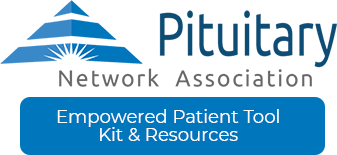Study Recommends Ideal Post-Pituitary Surgery Diet
Pituitary Journey: Thriving After Cushing’s
A former competitive athlete named Paris Dancy recounts his battle with Cushing’s in an article in Cushing’s Disease News. Read more:
Cushing’s and Diabetes: A Case Study
An article in Clinical Advisor looks at the case of a man with diabetes who was subsequently treated for a macroadenoma/Cushing’s Disease. Doctors aren’t sure if Cushing’s pre-dated the diabetes. Read more:
Psychological Symptoms Lead to Diagnosis of Pituitary Tumor
An article in Psychology Today looks at mental health diagnoses and presents the case of a woman in her thirties who experienced severe mood swings and was subsequently treated for a pituitary tumor. Read more:
Dr. Diagnosed With Cushing’s Post-Pregnancy
 An article in the Miami Herald spotlights the case of a family medicine doctor named Irmanie Hemphill who noticed weight gain, acne and high blood pressure six weeks after giving birth. She sought treatment and was diagnosed with Cushing’s disease. Read more:
An article in the Miami Herald spotlights the case of a family medicine doctor named Irmanie Hemphill who noticed weight gain, acne and high blood pressure six weeks after giving birth. She sought treatment and was diagnosed with Cushing’s disease. Read more:
Photo caption: Dr. Irmanie Hemphill (Courtesy F.S.U.)
Take Control of Your Acromegaly and Be Heard.
 “Acromegaly can be overwhelming and scary, but with the right support system, the right medical team, and our community of patients, you will be surprised by how incredibly resilient you can become.”
“Acromegaly can be overwhelming and scary, but with the right support system, the right medical team, and our community of patients, you will be surprised by how incredibly resilient you can become.”
Allison’s journey with acromegaly has been a bit unusual. From experiencing symptoms that weren’t typical to having symptom onset earlier in her life, Allison struggled to find an accurate diagnosis. However, she never stopped advocating for herself. Whether she was seeking additional opinions or voicing her own thoughts on potential treatment options, Allison made sure that she was heard. Now, she’s dedicated to doing the same for other people living with rare diseases such as acromegaly.
“Physically, I was managing. Emotionally, it was hard to accept my new normal. Connecting with other people who have acromegaly made me feel less alone and helped me accept my diagnosis.”
Allison considers herself a bit of an unusual acromegaly patient. The symptoms that led to her diagnosis weren’t what you typically see in a patient living with acromegaly. She experienced the development of painful lumps in her breasts. The pain was eventually too much that it kept her up at night. On top of that, she started experiencing night sweats.
“I thought, what was going on? I’m in my 20s. I definitely can’t be going through menopause.”
Allison finally decided to meet with doctors about getting a double mastectomy because the lumps in her breasts were becoming so painful. Before she did, Allison scheduled an appointment with an endocrinologist because she felt like something might be going on with her hormones. Outside of the lumps, she was experiencing random symptoms like excessive sweating, joint pain, back pain, and fatigue that all seemed unrelated to each other.
Thankfully, Allison’s endocrinologist, Dr. Lewis Blevins, medical director of the California Center for Pituitary Disorders at UCSF Medical Center, was very thorough with his testing. After studying her facial features, he decided to run a full hormone panel and test her IGF-1 levels. Allison had just celebrated her 30th birthday when she received her results, showing that her IGF-1 levels were very high. Due to these results, Dr. Blevins suspected she might have acromegaly due to a pituitary tumor, and his suspicions were later confirmed by an MRI.
Initially, the doctors told Allison everything went well with the surgery; however, a follow-up MRI showed residual tumor and additional testing revealed that her hormones had barely changed.
“Hearing that the surgery wasn’t successful and that I would need more treatment for my acromegaly was devastating.”
After a lot of deliberation with her endocrinologist around treatment options, Allison decided that radiation wasn’t appealing. She didn’t have any children yet, but she still wanted them. She ended up on an injection that was administered every 28 days; however, the needle was quite large, and she developed painful lumps around the site which took a long time to heal. In addition, Allison has a huge needle phobia!
Receiving injections was already proving to be a challenge for Allison, and the COVID-19 pandemic didn’t help. The office she went to for the injections wouldn’t let patients in without a negative COVID-19 test if they were experiencing symptoms. Unfortunately, some of the acromegaly symptoms, like headaches, are also symptoms of COVID-19. Allison knew something had to change. Thanks to new information being shared online, Allison learned about a new treatment option that would alleviate some of those burdens.
Through a community leader, Allison learned about a clinical trial for MYCAPSSA® (octreotide), an oral prescription medicine used in the long-term maintenance treatment of acromegaly in people for whom initial treatment with octreotide or lanreotide has been effective and tolerated. In Allison’s mind, having an oral treatment for acromegaly would help her regain control and be done with the painful injections. So once MYCAPSSA was approved by the FDA, she was over the moon.
Not one to sit around and wait for her doctor to make the decisions, Allison took charge. She reached out to the Chiasma Access and Patient Support (CAPS) team and Dr. Blevins to see if she could start using MYCAPSSA as soon as possible. Her endocrinologist went over the possible side effects, including headache, joint pain, nausea, weakness, diarrhea, and sweating a lot. She was also told that MYCAPSSA may cause problems with the gallbladder and that her doctor would monitor her thyroid levels, vitamin B12 levels, and blood sugar while on the medication.
Allison considers her transition to MYCAPSSA to be smooth. The biggest adjustment was figuring out the timing of taking the medication since it has to be on an empty stomach. To address this, Allison added an alert on her phone notifying her when to eat or take her medication. So far, Allison is very happy with MYCAPSSA and fortunate enough to not have any side effects. This is just her experience, yours may be different.
“As a patient, you have to make yourself a priority and have the tough conversations with your doctor.”
Her experience advocating for herself as a patient and her professional work, made Allison want to help others achieve the same results. That’s why Allison was so excited and grateful to work with Dr. Blevins and the Chiasma team to model conversations patients can have with doctors. Her experiences have now been translated into two unique educational resources for patients: a discussion guide called “Be Heard: A Guide to Discussing Treatment” and live audio “Real Talk: Making Yourself Heard in Treatment Discussions.” These tools will teach patients to advocate for themselves by providing treatment discussion tips, incorporating tips on how to make the most of your physician visits, and highlighting how to discuss a transition to MYCAPSSA with healthcare providers. You can listen to the helpful strategies on how to make yourself heard on https://mycapssa.com/resources/. It’s more important than ever for patients to truly be heard.
Since Allison’s transition was so smooth and MYCAPSSA helped alleviate some of her treatment burdens, she felt that it was important to be vocal about speaking up for yourself as a patient. For some, living with acromegaly makes it hard to feel like they’re in control. MYCAPSSA gave Allison the control over her daily life and schedule that she desired.
“Without acromegaly, there are so many people I’d never have met who have inspired me and led me to be an advocate for other patients.”
This is Allison’s personal experience living with and managing acromegaly. Other people’s experiences may differ. To watch Allison’s video and for more information about MYCAPSSA, visit www.MYCAPSSA.com.
INDICATION AND IMPORTANT SAFETY INFORMATION
What is MYCAPSSA (octreotide) for?
MYCAPSSA is an oral prescription medicine used in the long-term maintenance treatment of acromegaly in people for whom initial treatment with octreotide or lanreotide has been effective and tolerated.
If these treatments are effective and your body is tolerating it, you may be eligible to take MYCAPSSA instead of the injections. Ask your doctor if this oral treatment is appropriate for you.
What is the most important safety information I should know?
MYCAPSSA can cause problems with the gallbladder. Tell your healthcare provider if you have any of these symptoms: sudden pain in your upper right stomach (abdomen) or right shoulder or between your shoulder blades; yellowing of your skin or the whites of your eyes; fever with chills; or nausea.
MYCAPSSA may affect your blood sugar, thyroid hormone, or vitamin B12 levels. Tell your healthcare provider if you have any problems or conditions related to these. Your healthcare provider may monitor these levels during your treatment with MYCAPSSA.
Tell your healthcare provider if you have an irregular heartbeat.
Who should not use MYCAPSSA?
MYCAPSSA can cause a serious allergic reaction including anaphylactic shock. Stop taking MYCAPSSA right away and get emergency help if you have any of these symptoms: swelling of your tongue, throat, lips, eyes or face; trouble swallowing or breathing; severe itching of the skin with rash or raised bumps; feeling faint; chest pain; or rapid heartbeat.
Do not use MYCAPSSA if you are allergic to octreotide or any other ingredients in MYCAPSSA. If you need to know the ingredients, ask your healthcare provider or pharmacist.
If you have certain other medical conditions, you should use MYCAPSSA with caution. Tell your healthcare provider about all your medical conditions, especially the following: pregnancy or breastfeeding; liver disease; kidney disease; or difficulty in emptying bladder completely.
Tell your healthcare provider about all the medicines you take. MYCAPSSA may affect the way other medicines work, and other medicines may affect how MYCAPSSA works.
What are the possible side effects of MYCAPSSA?
The most common side effects are headache, joint pain, nausea, weakness, diarrhea, and sweating a lot.
Talk to your healthcare provider if you have any side effect that bothers you or that does not go away. You may report side effects to the FDA at 1-800-FDA-1088.
Keep MYCAPSSA and all medicines out of the reach of children.
How should I take MYCAPSSA?
Do not take MYCAPSSA with food. MYCAPSSA should be taken with a glass of water on an empty stomach. Take MYCAPSSA at least 1 hour before a meal or at least 2 hours after a meal (for example, you could take your morning dose 1 hour before breakfast and your evening dose at bedtime).
©2020 Chiasma, Inc. All rights reserved. MYCAPSSA and Chiasma are registered trademarks of Chiasma, Inc. PM-MC-US-0145 08/2020



